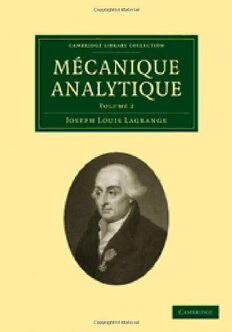
Mécanique analytique. Volume 2 PDF
391 Pages·2009·8.691 MB·French
Most books are stored in the elastic cloud where traffic is expensive. For this reason, we have a limit on daily download.
Preview Mécanique analytique. Volume 2
Description:
Joseph-Louis Lagrange (1736-1813), one of the notable French mathematicians of the Revolutionary period, is remembered for his work in the fields of analysis, number theory and mechanics. Like Laplace and Legendre, Lagrange was assisted by d'Alembert, and it was on the recommendation of the latter and the urging of Frederick the Great himself that Lagrange succeeded Euler as the director of mathematics at the Prussian Academy of Sciences in Berlin. The two-volume Mécanique analytique was first published in 1788; the edition presented here is that of 1811-15, revised by the author before his death. In this work, claimed to be the most important on classical mechanics since Newton, Lagrange developed the law of virtual work, from which single principle the whole of solid and fluid mechanics can be derived.
See more
The list of books you might like
Most books are stored in the elastic cloud where traffic is expensive. For this reason, we have a limit on daily download.
